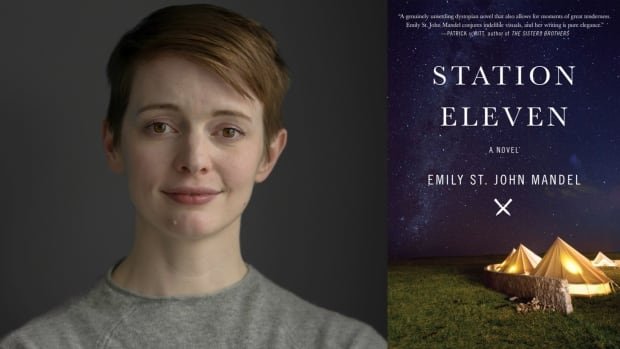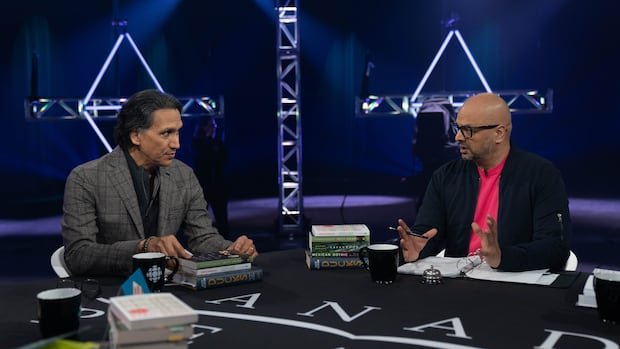
One of the most memorable lines from Emily St. John Mandel’s novel Station Eleven actually came from a 1999 episode of Star Trek: Voyager.
The line, “survival is insufficient,” lingered in St. John Mandel’s head long after her teenage years watching Star Trek on television while growing up on Demnan Island, B.C.
It gained a new life in Station Eleven, which follows survivors as they navigate a new world after the collapse of civilization and try to make sense of their interconnected pasts.
“It just struck me as the most elegant expression of something I believe to be true,” St. John Mandel, who is currently based in New York City, told Day 6 host Brent Bambury.
The two spoke about the novel’s legacy 10 years after its release, as well as the television adaptation that launched in 2021, as the real world was still gripped in a real-world pandemic. Here is part of their conversation.
In a lot of popular post-apocalyptic fiction, the world that’s imagined is a violent place. It’s a Darwinistic place. People are killed for a sandwich. But you show us a travelling symphony putting on Shakespeare. What drew you to thinking about the place that art would have at the end of the world?
Mostly what you do see in the genre is horror that just happens to be set in the aftermath of a total societal collapse. I had this feeling like, you know what? That’s been done. Like, I love The Road by Cormac McCarthy. I felt pretty confident that the world does not need another Road. That’s a brilliant book. And oh my God, it’s bleak. I will not read that for a second time. So it was partly a desire to do something different.
It was partly, honestly, a question of plausibility. I think that if there were some kind of devastating total collapse, if governments were entirely gone and we were fending for ourselves, I think there probably would be a fairly nightmarish period of chaos and mayhem and horror — you know, the world that you see in most of these fictions. It’s just not plausible to me that that lasts forever, at least not everywhere on earth.
Because, you know, and this kind of goes back to the Star Trek quote, I think most of us really would just like to raise our children and do work we like, and live peacefully with a minimum of physical threat. So it seemed to me that 20 years later, maybe we would have gotten it together a little bit and it might be a little bit less Mad Max, so to speak.
Why would they be putting on Shakespeare, not, say, reenacting the different episodes of Star Trek: Voyager?
When I started writing the book, at first I had them performing plays from a whole range of eras. So it was Shakespeare. It was also 20th century playwrights. It was also teleplays. I had them performing episodes of Seinfeld.
At the time it started to seem a little bit silly. I found myself thinking, OK, we’re in this post technological, post-apocalyptic wasteland. Our audience is riveted by comedies about the New York City real estate market? So it felt a little bit incongruous.
I also kind of liked the parallels between Shakespeare’s life, which was, of course, marked by the episodes of bubonic plague that swept over Elizabethan England again and again and again….
WATCH | Michael Greyeyes champions Station Eleven on Canada Reads
On the third day of Canada Reads, Michael Greyeyes argued that Indigenous peoples have already survived an apocalypse.
In Shakespeare’s time, plague would enter London. The theaters would shut down because it was just too dangerous. And small travelling companies would set out on the road. I just kind of liked the parallel there — you know, the idea of a world in which such a company might again set out.
But to be honest with you, 10 years after the publication of this book, if I were writing it now, I would stick with that original idea and have them also performing teleplays, because I think it’s kind of interesting.
The loss of technology is definitely a theme in this book. But the loss of 90 per cent of human beings on Earth is the theme that many people seized upon, because in 2020, the global pandemic struck.
So when all of this was happening, was there a moment for you when you realized that the pandemic was going to change how people connected with Station Eleven and that that was probably going to change your life?
I didn’t get it at first because as it first started to happen, I was as distracted as everybody else in New York City and everywhere, which is just like, oh my God, how do we deal with this?
It was a couple of months, I think, before I realized that Station Eleven kind of had this — I don’t want to say a new life, because sales have been pretty steady for years, but definitely kind of renewed interest in the wake of the pandemic.
Because that was not intuitive to me. I felt like, if anything, why would anybody want to read Station Eleven during a pandemic?
WATCH | Station Eleven TV series trailer
People would pick it up, read it, and then like, yell at me on Twitter, which was kind of funny. You know, “If I’d known this book was about a pandemic, I never would have read it.” And it’s like, Dude, it’s on the back cover. Like, this is not a spoiler, you know?
There was a strange period where I had a lot of invitations to write op-eds for my favourite magazines and newspapers in the world, and that felt kind of gross to me. Like I wasn’t going to use this real life human tragedy as a marketing opportunity for Station Eleven. So I avoided all of that.
And then of course, in the middle of it, the TV series came out, which was kind of wild. Yeah, just getting rapid-tested in order to go to the premiere in New York. Yeah, it was a strange time.
But the thing about Station Eleven, and the reason why I think it’s actually a pretty good book to read during a pandemic: this is a hopeful book, ultimately, isn’t it?
Absolutely. It’s a hopeful book.
It partly goes down to the timeline question we were talking about a little bit earlier, where if there were some kind of cataclysmic event, I think there would be a very chaotic time just after that.
But then there’s something after that, you know, and that’s kind of the world of Station Eleven. Like, OK, there was a cataclysmic event 20 years ago. Now we are once again in a world where there’s more than just survival.
And then what I tried to suggest at the end of the book is — this isn’t really a spoiler — but just a sense that the world’s changed and the world will keep changing. The world’s always ending around us, and a new world is kind of rotating into place to replace that.
And just the sense that there is life and hope and joy even after these absolutely cataclysmic moments. So I like to think that that sense pervades the book. That was certainly what I was thinking about when I wrote it.















